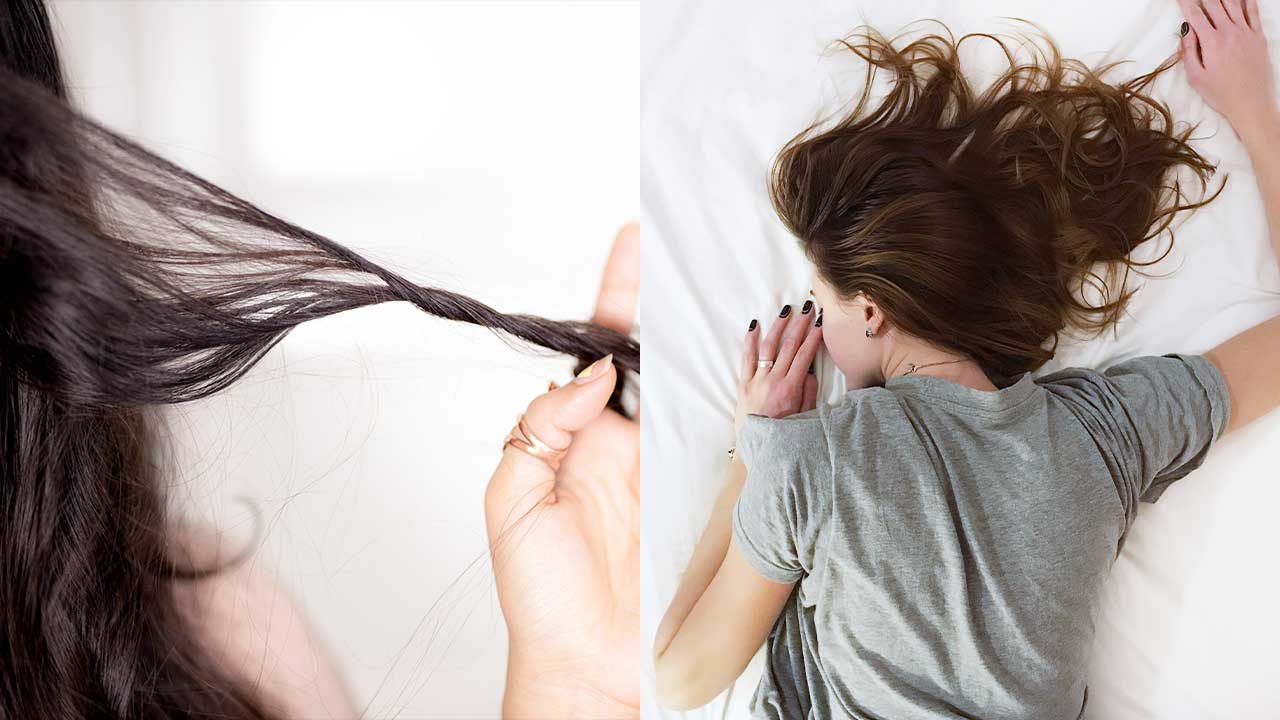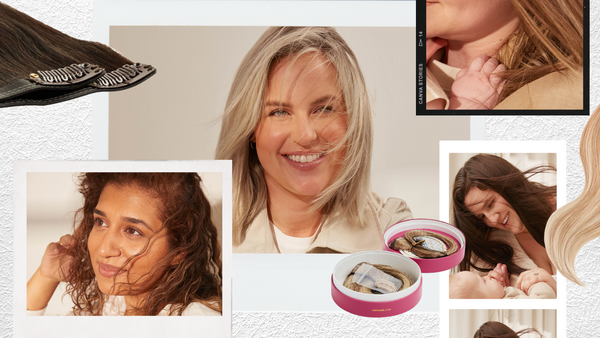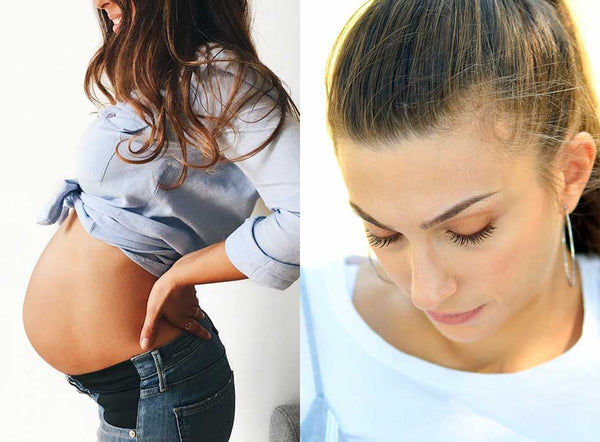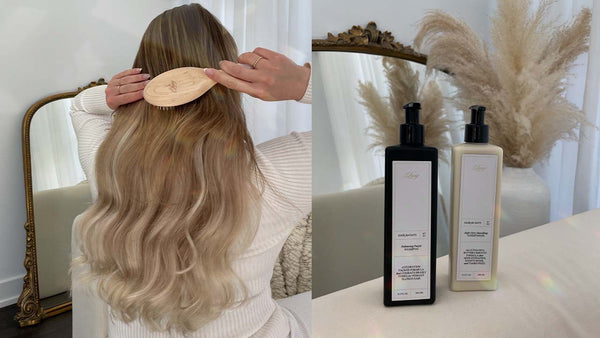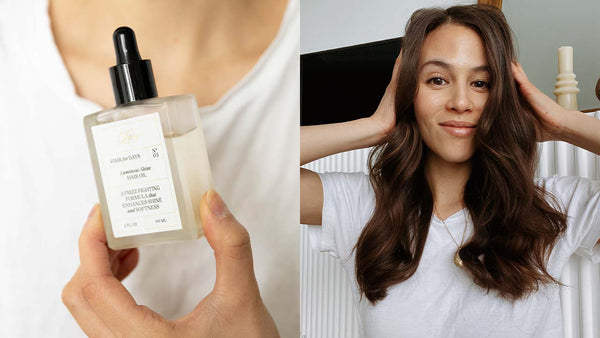There are many factors which cause women to experience hair loss though hormonal hair loss is the most common. Having a better understanding of what causes hormonal hair loss and how to treat it is key when looking for ways to style and care for your hair. For starters, It’s important to understand just how common hormonal hair loss is. Whether it’s during pregnancy, post-partum, menopause, or other health conditions, women’s bodies are built to withstand a number of changes. If you're feeling disheartened, remember that you’re not alone and there are many treatments out there to help.

Reasons for hormonal hair loss
Hypothyroidism
Hypothyroidism is a common condition where the body’s thyroid gland does not produce enough hormones. The thyroid gland which is just below the Adam’s apple, produces crucial hormones that affect vital functions, metabolism, and heart rate. Hypothyroidism can be caused by autoimmune disease, radiation therapy, thyroid surgery (where a part or all of the gland is removed), and even certain medications.
Studies show that women are also three times more likely to develop hypothyroidism than men. The signs and symptoms of hypothyroidism are not obvious at first and can include tiredness and weight gain. Over time, however, more serious symptoms like muscle weakness, elevated blood cholesterol, depression, and thinning hair can result. It’s important to note that thin, brittle hair can also be a sign of hyperthyroidism (an overactive thyroid gland), where the chemical imbalances in the body impact your ability to grow hair, as well as maintain the strength and health of the hair.
Diagnosing hypothyroidism can be done with a blood test. Based on the results, the most common treatment is with an oral medication which restores thyroid hormones. It’s best to speak with your doctor about other medications you’re taking as they may interfere with the synthetic thyroid medication. With the right balance, hypothyroidism can be treated and managed, counteracting the symptoms.

Hair extensions are commonly used by women with thin hair, and it all comes down to choosing the right type of extensions and positioning them well around your head. We suggest Seamless Luxy Hair Extensions which comes with a thin silicone base which sits flat against the head. Seamless extensions are comfortable and don’t feel heavy on your scalp, This set will blend in beautifully with fine hair, adding extra length and volume for thinner hair, while maintaining a very natural look.
Pregnancy and post-partum hair loss
During pregnancy, many women experience thicker, longer, and shinier hair thanks to higher-estrogen and progesterone levels and increased blood flow. These hormonal changes keep the hair in an ongoing stage of growth. However, once you deliver your baby, you may experience post-partum hair loss whereby hormone levels drop as the body starts to level out the changes post-delivery. This can cause a significant amount of hair to fall out, and in some cases, it happens suddenly.
For most women, this typically isn't more hair loss than what would have occurred during the 9 months of pregnancy, though it is happening in one prolonged instance. Experts say new moms can experience hair loss or shedding of about 400 strands a day, and it is common for many women—no matter how isolating it may feel in the moment.

The first few months with your newborn baby bring so much joy, and of course some stressful and sleepless nights—but your hair shouldn’t keep you down. Post-partum hair loss usually occurs during the first 2-4 months after giving birth, but excessive hair loss slows down by the six-month mark and hair will usually start to regrow at its normal rate.
To help keep hair growth and your body functioning healthily, it’s best to eat a balanced diet and ensure you’re getting enough iron and protein. Dark, leafy greens, fruit, healthy fats, and whole grains contain lots of essential vitamins such as iron, vitamin C, magnesium, and omega-3s. Some doctors may also suggest taking a multivitamin or continuing with your prenatal vitamin to help combat hair loss. When possible, keep stress to a minimum as it is known to be another factor of hair loss—take a few minutes to yourself when you can and don’t be afraid to ask for help. Every woman, especially new moms, are superheroes, but you don’t have to wear your cape 24/7.
While your hair begins to grow back, it’s essential to keep over styling and processing to a minimum. There are a ton of easy hairstyles tips and tricks to help you get styling out of the way so you can focus on what matters most. If you’re looking to add length and volume instantly, our 16 inch collection is a great choice for moms as they are shorter in length, making them easier to style, perfect for achieving mid-length hair and extra volume. Clip-in Luxy Hair extensions won't cause any damage to your hair, which is crucial as it begins to grow back naturally and can be easily applied and removed within minutes, so your precious time can be spent with your family.

High estrogen
Both men and women have estrogen and testosterone. While each hormone is often associated with a specific sex, a proper balance of both hormones are needed for healthy, proper bodily functions. Estrogen and progesterone work hand-in-hand for healthy sexual development in women, however, estrogen levels can become abnormally high in some women, relative to progesterone levels, which is referred to as estrogen dominance. Higher estrogen can happen naturally in the body, especially for women who are predisposed to more estrogen because of genetics or other illnesses, but high estrogen can also be caused by certain medications and even diet.
High estrogen can cause everything from weight gain, hair loss, mood swings, fatigue, and increased symptoms of PMS. A blood test can help determine your estrogen and progesterone levels and your doctor can prescribe medications to help regulate estrogen levels. An adjustment to your diet which includes low-fat and high-fiber is also recommended, as well as regular activity and losing excess weight. Treating high estrogen is essential to help prevent further complications such as thyroid dysfunctions, blood clots, and even strokes. Some of the symptoms may be hard to recognize but listen to your body; if you experience ongoing signs and symptoms, check in with your doctor.
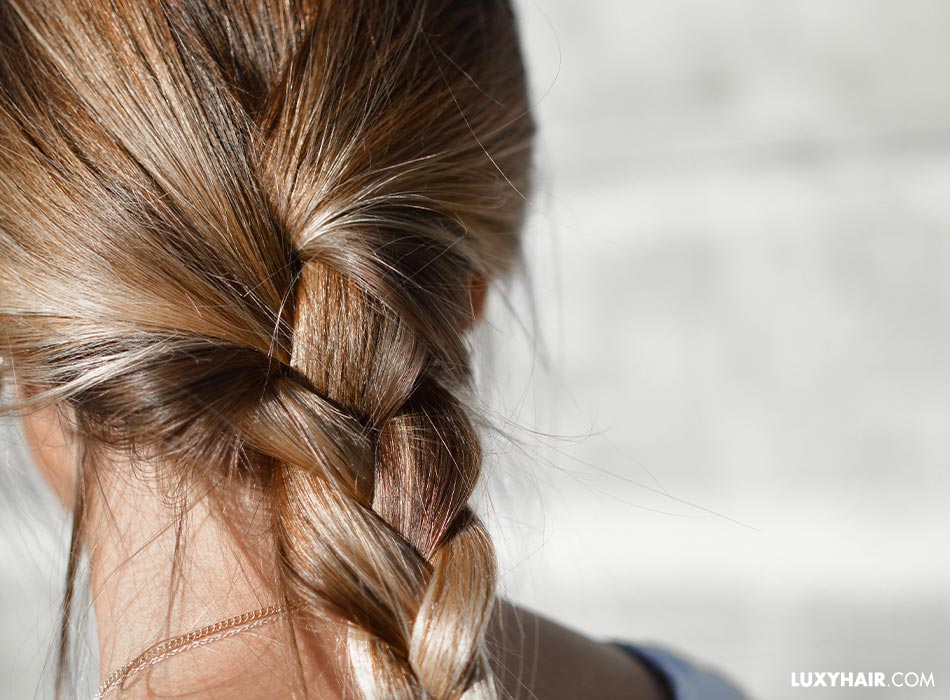
Menopausal hair loss
Menopause is a natural biological condition all women experience around the age of 50. It describes the stages or any changes a woman goes through before or just after menstruating and essentially indicates the end of her reproductive period. Early signs of menopause include hot flashes, tenderness in the breasts, irregular periods, fatigue, lower sex drive, and hair loss or thinning.
Hair loss during menopause occurs because of hormonal imbalances, as estrogen and progesterone – which help hair grow faster and stay on the head for longer periods of time – decrease in the body during this stage therefore slowing or stopping the growth and thickness of new hair. Lowered estrogen and progesterone hormones may also cause an increase in androgen or male hormones. Androgens can shrink hair follicles, which results in more hair loss.
While there are medications available to help with menopausal hair loss, it always helps to go natural as menopause is a biological condition that cannot be prevented. It’s best to check in with your doctor to ensure there are no other underlying conditions that can be contributing to hair loss such as iron deficiencies, hypo or hyperthyroidism, stress, or other illnesses. Drinking lots of water and eating a diet that is rich in essential fatty acids (salmon, walnuts, flaxseed oil, and more), whole grains, fruits, and veggies can all help combat hair loss. Taking supplements or vitamins such as B6 and folic acid, may also help, but be sure to ask your health professional first.
There are many changes in the body during menopause that can make women feel self-conscious, including hair loss, but it’s not something you’re experiencing on your own and should not stop you from feeling or looking your best. Speak with your doctor on treatments and ensure you’re treating your hair and scalp well. Opt for natural color treatments, avoid hot styling tools and hydrate and nourish your scalp to help promote healthy hair growth. Using hair extensions is common for women experiencing menopause, there are a ton of options out there. Speak with a hair stylist or professional who can help you find a style that works for you.

How to prevent hormonal hair loss
You may be asking, "can hormonal hair loss be reversed?" While some hormonal hair loss that occurs during menopause or post-partum cannot always be reversed or prevented, there are always steps to take to help promote healthy hair. Staying hydrated and getting enough sleep and rest are essential tools for overall health and are often overlooked as factors for healthy hair and bodies. Eating a diet that is rich in vitamins and nutrients can help the body battle and recover from illness and medical conditions as well. As women, hormonal health is essential, therefore, looking for signs or symptoms of an imbalance and seeking help early can help prevent further complications. Don’t be afraid to ask for help or go see your doctor for more help and advice.
Along with medical and natural treatments for thinning hair and hair loss due to hormones, using styling tricks and tools like hair extensions can easily help add volume and length when you want it and how you want it.
Have you experienced hormonal hair loss? How did you treat or deal with it? We’d love to read your comments below.
Written by: Rosalyn Solomon
